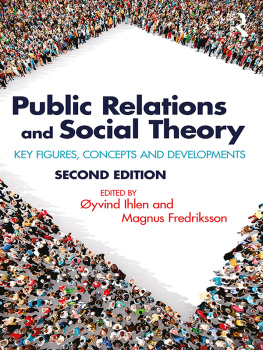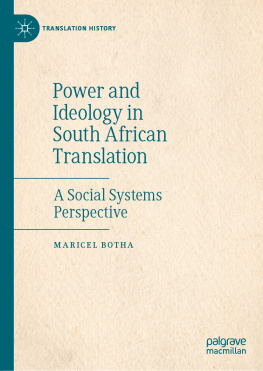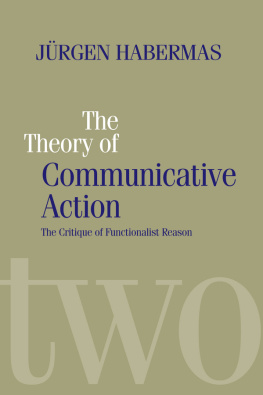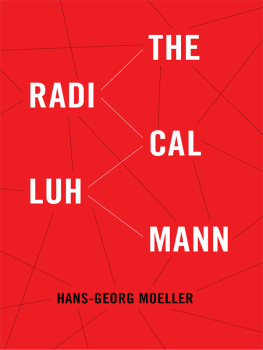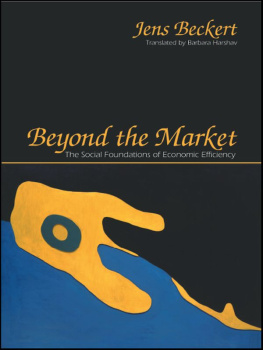Contents
Guide
Pages

Trust and Power
Niklas Luhmann
Edited, with a revised translation and new introduction, by Christian Morgner and Michael King
Original translation by Howard Davies, John Raffan and Kathryn Rooney
polity
First published in German as N. Luhmann, Vertrauen (1973, Ferdinand Enke Verlag, Stuttgart) and N. Luhmann, Macht (1975, Ferdinand Enke Verlag, Stuttgart)
Current German copyright: 2012/2014, UVK Verlagsgesellschaft mbH, Konstanz/Germany
First English edition published as N. Luhmann, Trust and Power 1979, John Wiley and Sons Limited (Translated by Howard Davies, John Raffan and Kathryn Rooney. Edited by Tom Burns and Gianfranco Poggi)
This English edition: Introduction and Editors Note Christian Morgner and Michael King. Text Polity Press, 2017.
Polity Press
65 Bridge Street
Cambridge CB2 1UR, UK
Polity Press
101 Station Landing, Suite 300
Medford, MA 02155, USA
All rights reserved. Except for the quotation of short passages for the purpose of criticism and review, no part of this publication may be reproduced, stored in a retrieval system or transmitted, in any form or by any means, electronic, mechanical, photocopying, recording or otherwise, without the prior permission of the publisher.
ISBN-13: 978-1-5095-1948-4
A catalogue record for this book is available from the British Library.
The publisher has used its best endeavours to ensure that the URLs for external websites referred to in this book are correct and active at the time of going to press. However, the publisher has no responsibility for the websites and can make no guarantee that a site will remain live or that the content is or will remain appropriate.
Every effort has been made to trace all copyright holders, but if any have been inadvertently overlooked the publisher will be pleased to include any necessary credits in any subsequent reprint or edition.
For further information on Polity, visit our website: politybooks.com
Niklas Luhmanns Sociological Enlightenment and its Realization in Trust and Power
Christian Morgner and Michael King
Sociological Enlightenment
Those engaged in the discipline of sociology, as it has evolved in English-speaking countries, may be forgiven if they have had some difficulty in recognizing these two books as bearing any close resemblance to what they have come to know as sociological research. After all, they make no attempt to apply established and respected empirical research methods to uncover facts about the ways in which people trust or exercise power, and to provide causal explanations for such facts. On the theoretical level, Luhmanns account may also appear strangely lacking in explanations of human social behaviour that would be amenable to testing through research in the way that Karl Popper recommended as marking the difference between science and non-science. Luhmann offers no explanations as such, but presents descriptive accounts of processes, using a conceptual framework that he himself has created. Yet, despite all this, Luhmann insists that the task he has undertaken is well and truly sociological, and rightly so, as this introduction will explain.
For Luhmann, the serious problems of fragmentation and credibility faced by the social sciences today can be traced back to the European Enlightenment of the seventeenth and eighteenth centuries. The old certainties the belief in the capacity of human intelligence to develop a transcendental rationality, and the idea of infinite progress through this increased knowledge seemed to work well for a time as a self-description of intellectual human endeavour. Where sociology was concerned, however, Luhmann saw this quest for truth and progress as an unfortunate starting point. It did not lead, as it was expected to do, to increased knowledge opening the way to a better world. Instead what has emerged is a multitude of coexisting theories and hypotheses which give the impression of employing reliable scientific methods, but which depend ultimately for their validity on the particular belief about human nature that the particular sociological observer subscribes to.
If sociology is to achieve its potential as a science, what is needed, according to Luhmann, is a new kind of enlightenment a sociological enlightenment one that rejects the unsustainable beliefs of old Europe by devising a totally new way of understanding what society consists of and how it could be studied. This is the Soziologische Aufklrung (sociological enlightenment). Moreover, for Luhmann, sociology is uniquely placed to enlighten society about itself. Sociology is enlightenment, he explained, when it observes society in a manner different from the way society in its different milieux observes itself. This is also meant to enlighten sociology itself by establishing a theoretical vocabulary that is on the one hand much more capable of grasping the complexity, eventfulness and ambiguities of social life, but on the other hand much more rigorous and encompassing in its approach. This puts emphasis on probing and challenging established patterns of thinking by comparing and relating them to, and contrasting them with, one another. Society is not seen as a natural outcome of human action, but as an improbable result of contingent events. Luhmann is here particularly interested in how these improbabilities are transformed into systems of meaning-generating communications. These are the generalized media of communication, of which trust and power are but two examples. The next stage, the embryos of which are visible in Trust and Power, but which is not fully developed until his later works on different social systems, is to observe how, within each system itself, the capacity evolves for constructing its own unique version of its environment, so that one is left with not just one overriding version of what society accepts as truth and reality, but with several versions, which coexist uneasily and which continually re-establish their own identity through developing new ways of accommodating the versions of reality produced by other systems. This, for Luhmann, is what both typifies modern society and makes classical, Enlightenment-based sociology so ill-equipped to capture the complexity of that society.
However, Luhmann would not have been Luhmann had he not added an ironic twist to the notion of circularity or self-reference, whereby within each system events are explained in terms of pre-existing assumptions of what constitutes truth and reality. Of course, sociology, he writes, is nothing but a milieu of its own. Only once this has been established, he remarks, might it be advantageous to enter into a dialogue with those morality-based understandings of the world.
As we have already noted, Luhmann made it clear in the Soziologische Aufklrung essays that he wrote at around this time that the task of his systems approach to functional analysis would be to offer a theory which would allow sociology to identify the concepts and processes that increase the likelihood of people acting together in communal ways and of these interactions repeating themselves in a way that provides stability for the participants. As Luhmann explains, Functional analysis is not a matter of establishing connections between established reasons or reliable knowledge in order to generate secondary knowledge. Rather, Problems are posed in terms of the maintenance of stability of action systems. What then are these systems and what is their role in Luhmanns theory?



